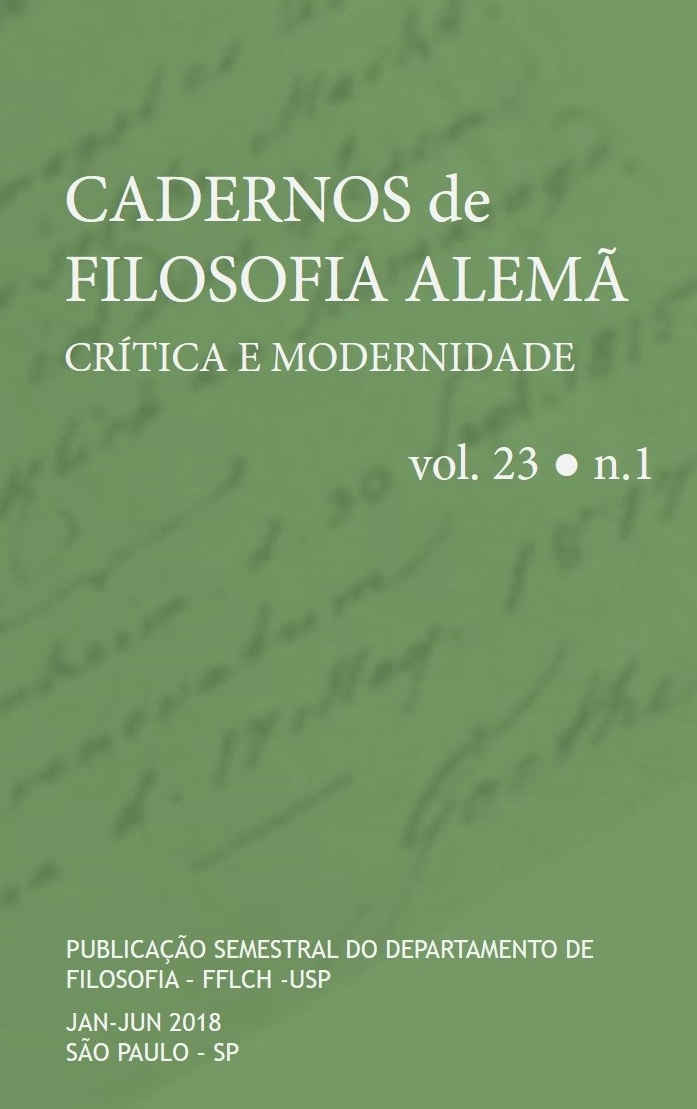Schellings complexified monism
DOI:
https://doi.org/10.11606/issn.2318-9800.v23i1p13-26Keywords:
monism, God, freedom, conflict, integrationAbstract
This paper presents a set of technicalities in order to understand and justify Schelling’s transition from a strong model of monism in his System of Identity to a more complex and dynamical one in his Philosophy and Religion and Freiheitschrift, both already under Boehmian inspiration. Since the second model includes a more complex processual and conflictive dimension, it has the advantage of accommodating a more concrete and substantive concept of freedom in the sense meant by Schelling, which is a power to foment good and evil. This demands, however, that morality and any difference in general are seriously assumed in the new conceptual framework, because a homogenization in a fashion similar to the Spinozan disqualified differences as illusive.Downloads
References
Baader, F. von. (1855). Sämmtliche Werke: Vorlesungen und Erläuterungen über J. Böhme’s Lehre. Leipzig: Hermann Bethman.
Böhme, J. (1842). Jakob Böhmes Sämmtliche Werke. Leipzig: Ambrosius Barth.
____________. (1923). Schriften Jakob Böhmes. Kanser, H. (org.). Leipzig: Im Insel.
Boutroux. M. E. (1908). Études D’Histoire de la Philosophie. Paris: Félix Alcan.
Coelho, H. S. (2012). Livre-arbítrio e sistema; Conflitos e conciliações em Böhme e Goethe. Juiz de Fora: UFJF. Tese de doutorado defendida na Universidade Federal de Juiz de Fora. Programa de Pós-graduação em Ciência da Religião.
Cooper, J. (2006). Panentheism. The Other God of the Philosophers. Michigan: Baker Academic.
Copleston, F.C. (1946). Pantheism in Spinoza and the German Idealists. Philosophy 21(78), pp. 42-56.
Danz, C.; Jantzen, J. (Hrsg.). (2011). Gott, Natur, Kunst und Geschichte. Schelling zwischen Identitätsphilosophie und Freiheitsschrift. Wien: Vienna University Press.
Dierken, J. & Korsch, D. (2004). Subjektivität im Kontext: Erkundungen im Gespräch mit Dieter Henrich. Tübingen: Mohr Siebeck.
Eschenmayer, C. A. (2016). Einleitung in Natur und Geschichte. Bibliothek 1800: Körper – Geist – Bewusstsein. Cristiana Seningaglia (Hrsg.) Stuttgart – Bad Cannstatt: Fromman-holzboog.
Hayner, C. P. (1967). Reason and Existence. Schelling’s Philosophy of History. Leiden: Brill.
Henrich, D. (1999). Bewusstes Leben. Stuttgart: Reclam.
Hofmann, P. (2001). Goethes Theologie. Paderborn: Schöningh.
Jaeschke, W. (1994). Religionsphilosophie und spekulative Theologie: Der Streit um die Göttlichen Dinge. (1799-1812). Quellenband. Hamburg: Felix Meiner Verlag.
Martensen, H. L. (1885). Jacob Boehme: His Life and Teaching; or Studies in Theosophy. London: Hodder and Stoughton.
Otto, R. (1994). Studien zur Spinozarezeption in Deutschland 18. Jahrhundert. Frankfurt: Peter Lang.
Richards, R. (2002). The Romantic Conception of Life: Science and Philosophy in the Age of Goethe. Chicago and London: Chicago University Press.
Schelling, F. W. J. von. (1997). Sämmtliche Werke. CD-ROM: Total Verlag.
Snow, D. E. (2000). The Evolution of Schelling’s Concept of Freedom. In: Asmuth, C.; Denker, A.; Vater, M. Schelling. Zwischen Fichte und Hegel. Bochumer Studien zur Philosophie 32. Amsterdam: Grüner.
Timm, H. (1974). Gott und die Freiheit : Studien zur Religionsphilosophie der
Goethezeit, Bd. 1, Die Spinozarenaissance. Frankfurt: Klostermann.
Vetö, M. (1998). De Kant à Schelling: Les deux voies de l’Idéalisme allemand. Grenoble: Jerôme Millon.
Zeltner, H. (1975). Das Identitätssystem – und was dann? In: Henrich, D. (Hrsg.) Ist systematische Philosophie möglich? Hegel-Studien 17. Bonn: Bouvier Verlag.
Zantwijk, T. van. (2000). Pan-Personalismus. Schellings transzendentale Hermeneutik der menschlichen Freiheit. Spekulation und Erfahrung 43. Suttgart – Bad Cannstatt: Froomann-holzboog.
Downloads
Published
Issue
Section
License
Information and conceptions on the texts are complete responsibility of the authors.
All the articles submitted before July 5th 2018 and those published after July 2021 are licensed under a CC BY-NC-ND license – except those published between the aforementioned dates, which are under the CC BY-NC-SA license. The permission for the translation of the material published under the license CC BY-NC-ND by third parts can be obtained with the consent of the author.
Open access policies - Diadorim
Rules applied before July 5th 2018:
Presenting a submission to our Editorial Board implies granting priority of publication for “Cadernos de filosofia alemã”, as well as transferring the copyright of texts (once published), which will be reproduced only with the manifest authorization of the editors. Authors keep the right to reuse the texts published in future editions of their work, without paying any fees to "Cadernos”. We will not grant the permission to re-edit or translate the texts for third parts without agreement of the author.


